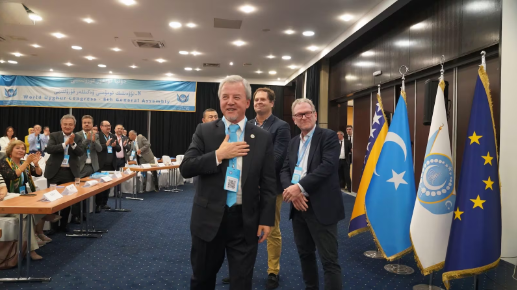The World Uyghur Congress chose Turghunjan Alawudun as its leader.
The World Uyghur Congress elected German national Turghunjan Alawudun as its new president on Saturday during the advocacy group’s general assembly in Sarajevo.
Alawudun, 58, was the sole candidate for the leadership of the organization amid what his predecessor, Dolkun Isa, had described as unprecedented harassment and threats from the Chinese government to disrupt the Oct. 24-27 gathering in the capital of Bosnia and Herzegovina.
A member of the WUC since its inception in 2004, Alawudun had been serving as one of the organization’s four vice chairman of its executive committee.
Alawudun told RFA Uyghur he is excited to take on his new role as president – a position he call “both honorable and challenging.”
“The role [of the president] must be properly and precisely executed because it is critically important in our struggle for freedom, democracy and human rights, as well as in the struggle for liberation of our homeland,” he said.
Alawudun said he intends to make the WUC “more advanced and more democratic.”
“We will use our best efforts to put an end to China’s ongoing genocide and free our people,” he said. “We will continue our advocacy work within democratic countries and among the people supporting us … in the international fora.”
The WUC general assembly brings together some 176 Uyghur delegates from 27 countries, including the United States.
In addition to electing a new president, the assembly also selected Zumretay Erkin as vice president, Rushan Abbas as chair of the executive committee, four vice chairmen and 16 commission chairs.
Making women’s voices heard
Speaking to RFA after being named the second female vice president in the WUC’s history, Erkin, 30, said that she is “committed to justice and accountability for my people,” and intends to bring “change” in her new role.
“It is vital that the voices of Uyghurs, especially the young Uyghurs in a diaspora community, are heard,” said the young woman, who has been working with the WUC for the last five years. “I want to dedicate my life to improving a system, an organization and institution that represents all Uyghurs.”
Erkin stressed that women‘s voices, especially young women’s voices, “need to be heard” in politics and at all levels of society.
“I believe that having a woman for this key position is extremely useful and important because representation matters,” she said. “And I do believe that with my energy, with my dynamism and commitment, I’ll be able to bring new ideas and also different ways of achieving our goals as well.”
Another woman and longtime activist, Rushan Abbas, 57, adds experience to the WUC’s executive committee as the executive director of activist group Campaign for Uyghurs, based in Washington, DC.
In a post to the social media platform X, Abbas expressed gratitude to her supporters and vowed to embrace her new role “with a profound duty to serve our people.”
Uyghur genocide
Based in Munich, the WUC is the largest and most prominent organization seeking to promote democracy, human rights and freedom for Uyghurs, 12 million of whom live in Xinjiang, a vast region in northwestern China.
It aims to use peaceful means to chart the political future of East Turkistan — Uyghurs’ preferred name for where they live.
For years, China has systematically oppressed the Uyghurs in Xinjiang, herding 1.8 million of them into concentration camps and subjecting many to forced labor. Many of the mostly Muslim Uyghurs have been arrested and imprisoned for contacting relatives outside of China or observing Muslim practices.
The U.S. government and other Western parliaments have labeled China’s treatment of the Uyghurs a “genocide,” and the United Nations concluded in an exhaustive report that China may be guilty of crimes against humanity in Xinjiang.
But China designates the WUC a terrorist organization, accusing it of conspiring with separatists and religious extremists to plan terror attacks and seek Uyghur independence. It also deems former WUC President Dolkun Isa, a human rights defender, a terrorist.
Elections ‘more democratic’
Attending the general assembly in Sarajevo as part of the group’s electoral commission was Sean Roberts, an international affairs professor at The George Washington University.
Speaking to RFA, Roberts said that throughout the general assembly, he had seen the WUC positioning itself as aspiring to be part of democratic society, and distancing itself from the Chinese Communist Party’s system of appointing its leaders.
“We’re seeing a situation globally where different countries are kind of lining up as either for a democratic system or frankly, against democratic systems,” he said. “And China, of course, is the largest and most powerful state that takes that position that they don’t really believe that democracy is the most effective system of governance.”
Roberts noted that he had been invited to help roll out a new electronic voting system for the WUC, which he deemed a success.
“The World Uyghur Congress is experimenting with trying to make their selection of their leadership much more democratic and I think it’s a very good beginning to that,” he said, adding that he expects that the organization will hold even more competitive elections in the future.
“But there were several positions that were very contested,” he said. “For every position there was an opportunity [for voters] to abstain … So that shows that everybody was able to express their opinions and their choice.”
The WUC’s general assembly came amid heightened threats against candidates for leadership positions.
Both Alawudun and Abbas faced slander, intimidation and threats since they nominated themselves for the positions, the WUC and Abbas told RFA.
In a statement issued on Oct. 18, the WUC outlined the threats and harassment by China intended to disrupt the organization’s general assembly. They included pressure by the Chinese Embassy in Bosnia and Herzegovina to cancel the meeting and threats to arrest Isa, a German citizen, while he is in Sarajevo.













